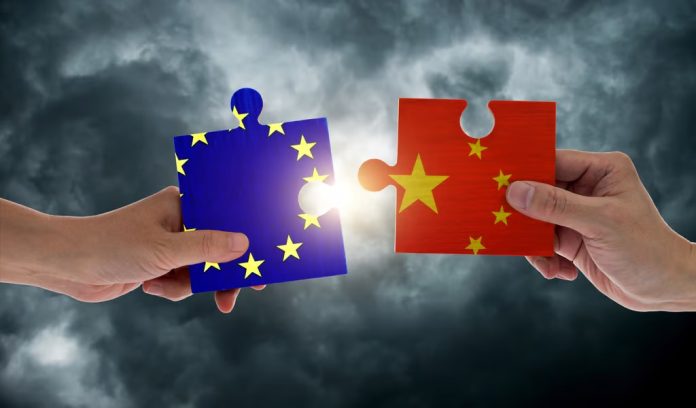BRUSSELS — A group of Chinese universities with military ties known as the “Seven Sons of National Defense” are involved in European Union-funded research projects, POLITICO has found.
The EU over the past decade has funded at least 14 projects for €26 million that worked with Chinese universities deemed “high-risk” by experts. Eight of these projects are still ongoing. The topics of the research projects ranged from decarbonization, climate modeling and heating and cooling technology to antennas and motor propulsion technology.
The research ties are awkward for Brussels, which has been trying to rekindle its relationship with China.
In May, the bloc adopted guidelines for EU countries and universities to shield researchers and universities from foreign interference — notably from China — for fear of seeing intellectual property leaking and its know-how being used against its interests.
China experts have warned that the Seven Sons group has “known links to military research.” The universities are under the management of China’s Industry and Information Technology Ministry and “play an important part in the Chinese defense industry,” a recent study by Datenna, a data intelligence platform focused on China, said.
All members of the Seven Sons club are categorized as a “very high” risk partner by the China Defence Universities Tracker of the Australian Strategic Policy Institute, a widely used instrument by universities to decide on research collaborations.
Just last March, five European universities kicked off an EU-funded project on decarbonization that got almost €2 million in EU funding and included the Beijing Institute of Technology, a Seven Sons club member, as a project partner, POLITICO’s analysis of a database of EU-funded research shows.
The bloc’s flagship research and development program, Horizon Europe, also funds a project on heat transfer technology, which has Beihang University as a partner — also one of the group of seven — and runs until 2027.
Many more projects with Seven Sons Members happened under Horizon Europe’s predecessor, Horizon 2020, since 2015: At least 13 projects, of which 7 are still ongoing.
One research project that runs until the end of next year studies motor technology and has two Seven Sons members as partners: the Harbin Institute of Technology and Beihang University.
Some of the projects described received a very significant EU contribution. One project around safer operations at sea, which ran between 2017 and 2020 and included Harbin Engineering University as a partner, bagged €6.5 million in EU funding.
Under the EU’s research programs, Chinese participants are seen as “associated partners,” meaning they don’t receive EU funding but are involved in specific research tasks.
Officials in some European regions, like Belgium’s northern Flanders, have ruled out working with the group of seven altogether.
But European academic institutions have warned against shutting China out entirely from research collaborations, especially in areas like climate research, arguing it conflicts with academic freedom and slows academic progress.
Some universities involved recognized the risk of working with the Seven Sons universities but decided to proceed as the research project’s topic wasn’t particularly controversial.
The University of Groningen, which coordinated the decarbonization project, said that the Seven Sons were considered “high-risk” and collaboration requests were reviewed to check whether there was a risk of the results being misused.
“The research topic is such that we didn’t see a risk of misuse for military or other unwanted goals,” the university said in a statement shared with POLITICO’s China Watcher newsletter.
Another partner, the University of Zaragoza, said that research cooperation with China on the topic of decarbonization was “desirable, as the Chinese CO2 footprint will have a major effect on global climate change.”
It echoes the European Commission’s position that research can occur under certain circumstances.
“I would see our relationship with a more pragmatic eye because, in other areas, we can be partners, such as agriculture, food, climate change,” the bloc’s innovation chief Iliana Ivanova told POLITICO last year.
The Commission declined to comment on POLITICO’s question about the collaborations with Seven Sons universities.







































